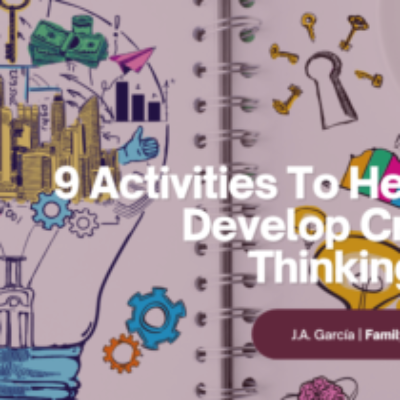
Is Your Child Gifted? How To Support Them When They’re Too Smart
Do you think that your kids are too intelligent for their age? Have you noticed that they get bored at school, read a lot, and that solving complex problems is easier for them?
If that sounds like your kids, you may have gifted children.
Gifted children aren’t only intelligent kids. They’re more like little geniuses. Children with above-average intellectual abilities require specific education programs to satisfy their academic needs.
Keep reading to learn all about gifted children, their characteristics and traits, some of the unique problems they often face, and how you can support them.
Who Is Homeschool Spanish Academy?
We’re an online Spanish school committed to empowering parents and their children to live happier lives, enjoy stronger learning outcomes, and experience real success.
Learn more about our classes. ➡️
TABLE OF CONTENTS
- What Is a Gifted Child?
- Problems That Gifted Children Have To Overcome
- 8 Ways To Support Your Gifted Child
- You Can Be the Reason Why Your Gifted Child Reaches Their Full Potential
What Is a Gifted Child?
Gifted children are defined as those “who demonstrate an advanced ability or potential in one or more specific areas compared to others of the same age, experience or environment.”
However, definitions of giftedness vary widely. So much so that different states in the US may have other definitions for it.
There’s even a federal definition of “gifted” and “talented,” which refers to children “who give evidence of high achievement capability” in different areas and “who need services or activities not ordinarily provided by the school.”
Keep that last sentence in mind, as we’ll get back to it later.
Gifted Children Characteristics
There are different traits and characteristics that highly gifted children usually share. However, these are some of the most common signs of a gifted child:
- Strong curiosity
- Comprehension of material several grade levels above their age
- Rapid comprehension
- Sophisticated language
- Perfectionism
- Extraordinary memory
- Score in the 99.9th percentile on IQ and achievement tests
Hear Your Child Speak Spanish! Your Free Trial Class Is Waiting ➡️
Gifted Child Behavior
Intelligent kids have to deal with different challenges, and their behavior may adapt due to these challenges. Genius children usually behave in some of these ways:
- Self and socially aware
- A mature sense of humor
- High level of intensity
- High level of sensitivity
- Overexcitability
- Divergent interests
- Perseverance
Gifted IQ Range
If you think your kid may have gifted child syndrome, you can consider doing an IQ test to see if those traits translate into a high IQ.
If your child scores 130 and above on their IQ test, that’s a very strong sign of giftedness.
However, different sources have different IQ ranges.
For example, the Wechsler Intelligence Scale for Children uses the following scale:
- IQ score between 115 and 129 – Mildly gifted child.
- IQ score between 130 and 144 – Moderately gifted child.
- IQ score between 145 and 159 – Highly gifted child.
- IQ score between 160 and 179 – Exceptionally gifted child.
- IQ score of 180 and higher – Profoundly gifted child.
Notwithstanding these IQ ranges and definitions, you can’t simply make a checklist of your children’s milestones and make them take an IQ test. You must know that “gifted identification often relies on a mix of gifted testing and more qualitative observations.”

Problems That Gifted Children Have To Overcome
As mentioned before, highly gifted children deal with problems that other kids of the same age range don’t.
Here are a few:
1. Burnout
Gifted kid burnout refers to the “chronic exhaustion that stems from a mismatch between the individual and their current educational environment.”
It’s usually the result of long-term stress and may take the form of mental fatigue, physical exhaustion, and emotional detachment.
2. Asynchronous Development
Asynchronous development refers to a problem gifted children have to deal with when they “develop unevenly across skill levels.”
This means that a gifted child usually is very advanced in intellectual skills but could be lagging in social of fine motor skills.
The Columbus Group suggests that this situation requires “modifications in parenting, teaching, and counseling.”
3. Underachievement
Some gifted children underperform at school regardless of their exceptional talents due to a lack of motivation or psychological issues, such as perfectionism and anxiety, among other possible reasons.
If a gifted child isn’t being challenged at school, they can get bored and waste all of that great potential. That’s why it’s important to work hand-in-hand with their teachers to help them deal with these unique problems.
4. Overexcitability
Overexcitability is one of the most common problems gifted children have to deal with.
For example, kids with sensual overexcitability may be “bothered by certain clothing textures or odors.”

8 Ways To Support Your Gifted Child
To support your gifted child and help them to deal with these specific issues that come with their giftedness, you can try one or several of these eight strategies:
1. Ability Grouping
The National Education Association defines “ability grouping” as “grouping learners together according to their talents in the classroom.”
This can happen within the classroom or between different grade levels.
“Ability grouping” allows gifted children to learn in a group more according to their own intellectual needs and at a faster learning pace.
2. Gifted Pull-out Classes
Pull-out classes or a pull-out program is when a gifted child “is taken out of their regular classroom for one or more hours a week and provided with enrichment activities and instruction alongside other gifted students.”
The idea is to intellectually challenge the kids and keep them focused and interested in learning.
Also is meant to avoid the boredom that many of them suffer in ordinary lessons.
3. After-School Programs
Some public schools run after-school programs specifically designed for gifted children. An after-school program offers freedom from the constraints of the standardized curriculum.
It also gives your gifted child an opportunity to dive into more challenging and exciting topics.
4. Gifted Summer Programs
Gifted summer programs are summer courses designed for and attended by talented children.
For instance, the Summer Institute for the Gifted has been providing this type of “summer academic enrichment program” since 1984. There are plenty of other institutions that offer these types of programs.
5. Gifted Enrichment Programs
Enrichment programs are another option that schools and institutions across the US provide.
They usually take place during the weekends and have an “accelerated pace, greater depth, and a wide range of topics outside the typical school curriculum.”
6. Acceleration
As its name suggests, acceleration is a strategy “that moves students through an educational program more rapidly than their age-mates.”
The idea behind acceleration is to match the level of the content learned with the student’s ability. Accelerated students perform better on achievement tests and are less likely to become bored
7. Heterogeneous Grouping
This strategy consists in “mixing people with varied traits and abilities in one group.”
Research shows that heterogeneous grouping “has positive socioemotional outcomes for gifted students.”

8. Work With Your School as an Advocate
This is crucial. Parents need to engage and collaborate with institutions to create, develop, and fund a gifted program—if there’s none in their community.
This work requires patience, persistence, and lots of diplomacy, as the resources destined for gifted education are usually scarce or non-existent, depending on what state you live in.
To learn more about how you can help your gifted child as an advocate, I strongly recommend reading this article.
Also, you should consider joining the National Association for Gifted Children to find more information about giftedness and how to deal with the challenges it presents.
You Can Be the Reason Your Gifted Child Reaches Their Full Potential
Having a gifted child is both a gift and a challenge. Giftedness presents unique problems that arise from the mismatch between your children’s ability and age.
Public education isn’t designed to deal with children like yours. Even when there’s much more awareness about gifted children these days, funding for gifted programs is still very limited.
Nonetheless, giftedness also represents a great opportunity, and it’s up to you and your kids to make the most of it.
There are different ways to do it, and you can try some of the strategies explained above. At the end of the day, you’re the one who determines the path that your gifted child will take to reach their full potential.
Explore Our 5-Star Online Spanish Programs for K-12 Students

Join one of the 40,000 classes that we teach each month and you can experience results like these

“This is the best way for your kid to learn Spanish. It’s one-on-one, taught by native Spanish speakers, and uses a curriculum.”
– Sharon K, Parent of 3

“It’s a great way to learn Spanish, from native Spanish speakers in a 1-on-1 environment. It’s been fairly easy to schedule classes around my daughter’s other classes. The best value for us has been ordering multiple classes at a time. All the instructors have been great!”
– Cindy D, Parent of 3

“HSA offers very affordable, quality, one on one classes with a native speaker. My son has greatly benefited from taking classes. We have seen his confidence increase as well as his pronunciation improve, because he learns from a native Spanish speaker. HSA has quick, personal customer service. Our family has been very pleased with our experience so far!”
– Erica P. Parent of 1
Enjoy more family health and wellness content! It’s for you.
- 10 Homeschooling Styles You Need to Explore in 2023
- Local Learning Networks: Finding Homeschool Co-ops Near You
- Home Sweet Classroom: Creating Engaging Spanish Lessons at Home
- 10 Websites Offering Short Stories in Spanish for Beginners
- Can Homeschoolers Participate in Sports?
- 10 Tips for When Homeschool Isn’t Working
- Is There Homeschooling in Latin America?
- 10 Productive Back-to-School Activities for Your Spanish Class
- Language Learning with Netflix: How to Use the Chrome Extension - April 18, 2024
- 23 Common Spanish Prepositions You Can Use Today - March 27, 2024
- 25 Common Subjunctive Phrases in Spanish Conversation - March 21, 2024





